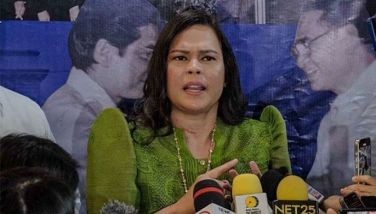The power of righteous dissent
There is a recent movie, “The Power of the Dog” starring Benedict Cumberbatch and Kirsten Dunst, which I watched during the pandemic lockdown as the title was intriguing. While it is not a political story and there is no direct relation to social/political dissent, it is a nuanced drama about how the oppressed/powerless eventually gets even with oppressors. It reminds me of a Chinese saying, “no enemy is so small he cannot harm you,” sometimes even in death.
Dissent in general means to withhold assent or approval to a proposal or a decision. In Filipino, it is “hindi sumasang-ayon or salungat.” In the socio-political context, it means to oppose or go against official/government decisions, policies or proposals. Classic examples of dissents are against slavery, racial discrimination, the women’s rights movements in many parts of the world and particularly in the U.S.A., that eventually overturned/changed official government policies in many countries. Dissents are still ongoing on these issues in some countries, with dissent against LGBT policies joining the fray.
The evolution of society is also the evolution of dissent, as two or more people cannot be expected to agree at all times. As society got bigger and had more members, differing interests also emerged, so that social/political systems were developed and the mechanics of consensus and majority rule were agreed upon. Initially, the strongest and the mightiest got their way most of the time until numerical quantity overrun physical strength or quality. Then the concept of democracy started with its advantages and disadvantages, and the politicians tried their best to game the system. Up to the 18th century, very little social/political dissent were allowed and evident, as most states/countries were ruled by autocrats who ruled by unassailable decrees backed up by armed forces. While small nation-states like Greece and Rome experimented with democracy, it was only in the 19th century and onwards that democratic governments flourished along with the improving world economies that dispersed wealth and made the people less dependent on the rulers/ruling class.
In the 20th century, with better information and communication technologies, dissent in many parts/states/countries is known to people all over the world, which in some way encourages support to the dissenters. Russia, China, and many countries in Asia, Africa and Eastern Europe have had recurring strikes/demonstrations. Recently, the most prominent are the ongoing bloody demonstrations in Iran, Ethiopia, Sri Lanka, Peru and Myanmar. There are also simmering dissents in other countries like Venezuela, Argentina and Lebanon but these are well suppressed by their governments and have not reached boiling point.
While the more popular dissents are coming from the ideological left or left of center, there are also dissents coming from the rightists. The dissents from the left are for truth, justice, freedom, liberty and human/equal rights, while the rightest are for stronger law enforcement, anti-migrants, and/or preservation of status quo. As society becomes more egalitarian and democracy regains its dominance, it can be expected that the dissents and demonstrations will be more coming from the democratic ideologues against autocratic governments. The Trumpers and anti-Trumpers demonstrations and the ongoing dissension in American politics between the Democrats and the Republicans are the best illustrations.
In the Philippines, while the politics is more dominated by personalities rather than ideologies, and dissent may be viewed as against political personalities, the underlying objection is really against authoritarianism and suppression of freedom. Until the declaration of martial Law in 1986, Filipinos enjoyed more freedom than any other Asian country, and they celebrated the end of Martial law and the regaining of the freedom previously enjoyed. The heavy handed regime of Duterte imperiled these recovered freedom and liberties, and people are worried that the current BBM presidency will again curtail them. They do not relish the return of the impunity/abuse of authority/graft and corruption during the martial law and to a lesser degree during the Duterte years. The huge public dissent on the Maharlika Wealth Fund (MWF) is just a signal or beginning of this sentiment of dissent.
Dissents have succeeded in changing governments, politics and society. They are not going away. There is no way that women, racial or economic minorities will give up their well won rights. Like democracy, it is the way of the future.
- Latest






















